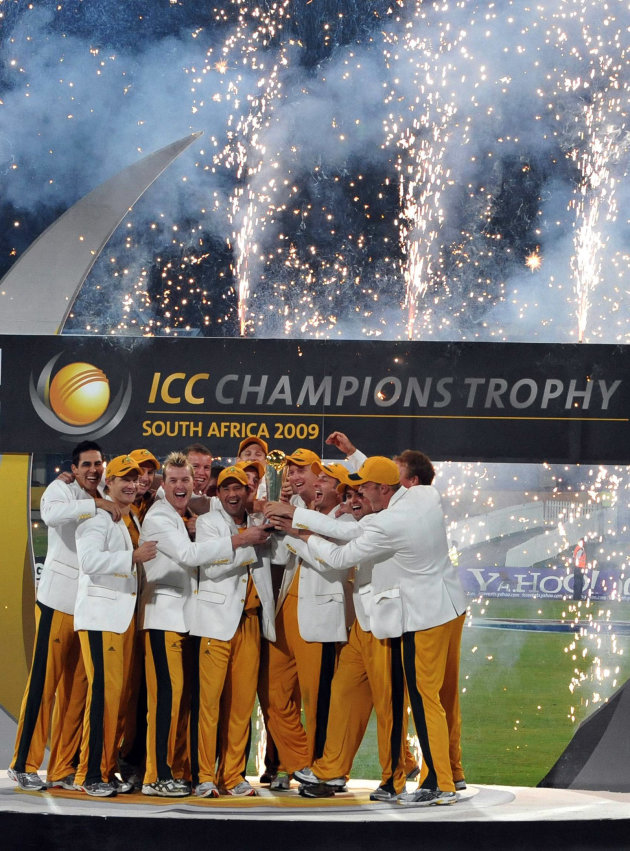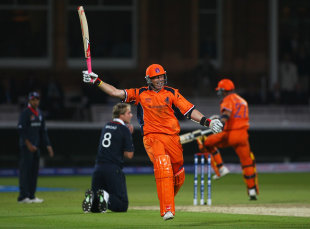
The scrapping of the Champions Trophy and expanding the T20 World Cup are two laudable decisions taken by the ICC.
The International Cricket Council (ICC) is often at the wrong end of allegations of not being proactive enough, but every once in a while, the game's governing body takes decisions worthy of their authority.
Three such important decisions were taken by the ICC executive board last week in Dubai - increasing the number of teams to 16 in the Twenty20 World Cup from 2014; scrapping the Champions Trophy after its 2013 edition and agreeing to go for a constitutional amendment to spilt the role of the president by creating a new post of chairman who won't have any voting rights.
FAREWELL CHAMPIONS TROPHY
Rahul Dravid, who is now a former India international cricketer, during the course of his much-lauded and appreciated speech at the Sir Don Bradman Oration in December 2011, touched upon a range of topics including the need to review the scheduling of international matches, especially one-day internationals (ODIs).
Dravid said, "We now realise that the sport's three formats cannot be played in equal numbers – that will only throw scheduling and the true development of players completely off gear. There is a place for all three formats, though, we are the only sport I can think of which has three versions. Cricket must treasure this originality. These three versions require different skills, skills that have evolved, grown, changed over the last four decades, one impacting on the other."
Referring to the number of non-context ODI matches being played, the former India captain said, there have been murmurs since 1985 that there is too much meaningless one-day cricket. Dravid added, "Maybe it's finally time to do something about it".
The ICC has finally decided to do away with some of these meaningless ODIs by stating the 2013 edition of the Champions Trophy to be held in England, will be the last of that under-fire tournament. The reason given by the ICC for the decision was that it wants to have only one championship for Tests, ODIs and Twenty20 Internationals, from 2015. The ICC Test Championship, however, will not be held before 2017, and that's a mighty shame because most of the current international cricketers would have retired in the next five years.
Coming back to the Champions Trophy, it had long passed its sell-by date, and with the ICC World Cup already in place; the presence of a similar but shorter tournament that was done away with in between really had no place in the already packed international calendar. Especially considering that a few marquee Test series have been reduced to a two-match series in order to accommodate more matches of the shorter format in the schedule. An Australia vs South Africa or Sri Lanka vs England Test series deserves to be of at least three-four matches, and if that means, reducing the number of 'meaningless' ODIs and T20Is, then so be it!
The 50-over format is also undergoing a mini-crisis, and its future will be safeguarded only when the ICC and its member boards recognise that piling on the number of inconsequential matches will only increase the pressure on ODIs. That's the reason the scrapping of the Champions Trophy after its 2013 edition is a welcome move as it not only opens up a window for international cricketers to take a break; but also gives boards the opportunity to better plan and schedule international tours.
MOVE IN THE RIGHT DIRECTION
The ICC executive board's decision to increase the number of teams from 12 to 16 starting with the 2014 Twenty20 World Cup to be hosted by Bangladesh is an overdue decision, but I am pleased to note that the governing body has finally recognised the importance of including more Associate and Affiliate members, at least in the shortest format of cricket.
After announcing the decision, ICC Chief Executive Haroon Lorgat said,"I'm sure that is very comforting to all associates and affiliates...it provides them with a greater chance of competing on the global stage."
Well, I am sure the Associates and Affiliates are delighted at being given the opportunity to showcase their talent on the global stage; but surely, these countries have only been given their just due.
In the first week of April, shortly before the ICC executive board met in Dubai, I had written this column; in which not for the first time, this writer made a case for cricket to be made more inclusive; and wrote: "The Twenty20 World Cup could easily have included at least six countries from the qualifiers, especially taking into consideration that Afghanistan and Ireland were always likely to be the two member nations to go through. Increasing the number of participating countries would only have extended the tournament by a few more days, but it would have been worth it taking the bigger picture into account of popularising the game in places where the sport is struggling to create a place for itself."
It is a relief that the ICC has finally acknowledged the need to see the big picture, and has opened the Twenty20 World Cup from 2014 onwards to an increased number of Associates and Affiliates.
A lot more can certainly be done, and one can only hope that the decisions taken by the ICC executive board at Dubai in April 2012, are an indication of the ICC's willingness to take the hard decisions for the greater good of the game.
As a parting shot, the ICC would also do well to make the Decision Review System mandatory for all international matches and series; including the ones featuring India. The question though is will the ICC want to risk upsetting the cash-rich BCCI?
Three such important decisions were taken by the ICC executive board last week in Dubai - increasing the number of teams to 16 in the Twenty20 World Cup from 2014; scrapping the Champions Trophy after its 2013 edition and agreeing to go for a constitutional amendment to spilt the role of the president by creating a new post of chairman who won't have any voting rights.
FAREWELL CHAMPIONS TROPHY
Rahul Dravid, who is now a former India international cricketer, during the course of his much-lauded and appreciated speech at the Sir Don Bradman Oration in December 2011, touched upon a range of topics including the need to review the scheduling of international matches, especially one-day internationals (ODIs).
Dravid said, "We now realise that the sport's three formats cannot be played in equal numbers – that will only throw scheduling and the true development of players completely off gear. There is a place for all three formats, though, we are the only sport I can think of which has three versions. Cricket must treasure this originality. These three versions require different skills, skills that have evolved, grown, changed over the last four decades, one impacting on the other."
Referring to the number of non-context ODI matches being played, the former India captain said, there have been murmurs since 1985 that there is too much meaningless one-day cricket. Dravid added, "Maybe it's finally time to do something about it".
The ICC has finally decided to do away with some of these meaningless ODIs by stating the 2013 edition of the Champions Trophy to be held in England, will be the last of that under-fire tournament. The reason given by the ICC for the decision was that it wants to have only one championship for Tests, ODIs and Twenty20 Internationals, from 2015. The ICC Test Championship, however, will not be held before 2017, and that's a mighty shame because most of the current international cricketers would have retired in the next five years.
Coming back to the Champions Trophy, it had long passed its sell-by date, and with the ICC World Cup already in place; the presence of a similar but shorter tournament that was done away with in between really had no place in the already packed international calendar. Especially considering that a few marquee Test series have been reduced to a two-match series in order to accommodate more matches of the shorter format in the schedule. An Australia vs South Africa or Sri Lanka vs England Test series deserves to be of at least three-four matches, and if that means, reducing the number of 'meaningless' ODIs and T20Is, then so be it!
The 50-over format is also undergoing a mini-crisis, and its future will be safeguarded only when the ICC and its member boards recognise that piling on the number of inconsequential matches will only increase the pressure on ODIs. That's the reason the scrapping of the Champions Trophy after its 2013 edition is a welcome move as it not only opens up a window for international cricketers to take a break; but also gives boards the opportunity to better plan and schedule international tours.
MOVE IN THE RIGHT DIRECTION
The ICC executive board's decision to increase the number of teams from 12 to 16 starting with the 2014 Twenty20 World Cup to be hosted by Bangladesh is an overdue decision, but I am pleased to note that the governing body has finally recognised the importance of including more Associate and Affiliate members, at least in the shortest format of cricket.
After announcing the decision, ICC Chief Executive Haroon Lorgat said,"I'm sure that is very comforting to all associates and affiliates...it provides them with a greater chance of competing on the global stage."
Well, I am sure the Associates and Affiliates are delighted at being given the opportunity to showcase their talent on the global stage; but surely, these countries have only been given their just due.
In the first week of April, shortly before the ICC executive board met in Dubai, I had written this column; in which not for the first time, this writer made a case for cricket to be made more inclusive; and wrote: "The Twenty20 World Cup could easily have included at least six countries from the qualifiers, especially taking into consideration that Afghanistan and Ireland were always likely to be the two member nations to go through. Increasing the number of participating countries would only have extended the tournament by a few more days, but it would have been worth it taking the bigger picture into account of popularising the game in places where the sport is struggling to create a place for itself."
It is a relief that the ICC has finally acknowledged the need to see the big picture, and has opened the Twenty20 World Cup from 2014 onwards to an increased number of Associates and Affiliates.
A lot more can certainly be done, and one can only hope that the decisions taken by the ICC executive board at Dubai in April 2012, are an indication of the ICC's willingness to take the hard decisions for the greater good of the game.
As a parting shot, the ICC would also do well to make the Decision Review System mandatory for all international matches and series; including the ones featuring India. The question though is will the ICC want to risk upsetting the cash-rich BCCI?

No comments:
Post a Comment